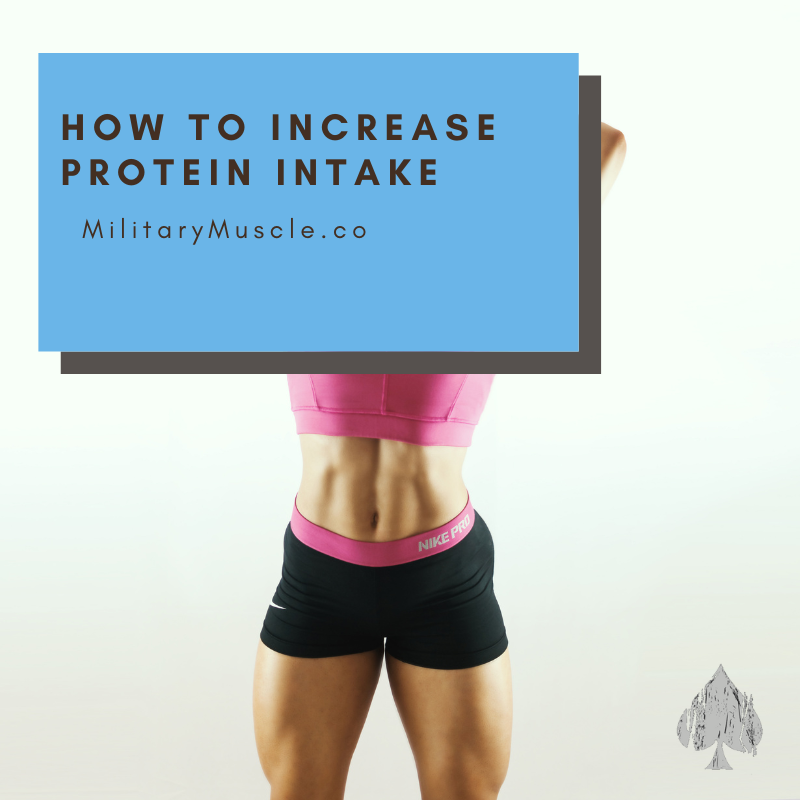How to Increase Protein Intake for Building Muscle

Written by Ben Bunting: BA, PGCert. (Sport & Exercise Nutrition) // British Army Physical Training Instructor // S&C Coach.
-
- What is protein?
- Why Do You Need Protein?
- How much protein should you consume daily?
- What foods are the highest in protein?
- How else can I build muscle?
It's hard to build muscle mass. You may see immediate results when you first start exercising, but your progress will soon plateau.
You can also be held back by life. Whether it's a busy schedule, family obligations, or simply being 'past prime', it is difficult to maintain progress.
To maintain and increase muscle mass, eating more protein is essential. It is important to keep in mind that our diet can be just as, or even more, important than the workouts we perform.
How can you increase your protein intake?
Is protein the only way to encourage muscle protein synthesis or can we do other things?
This article will show you how to increase your protein intake to build muscle mass.
What is Protein?
The macronutrients we require to perform our basic body functions are carbohydrates, fats and protein.
Protein is essential for our growth, muscle building, bone health and hormone regulation. It also forms the basis of hair and nail.
Amino acids are the building blocks of protein. Many of the amino acids that our bodies can produce are amongst the twenty available. We can get only nine of the essential amino acids through dietary proteins.
Essential amino acids play a key role in the synthesis of muscle proteins, so a diet high in protein is important to building muscle.

How much protein should you consume daily?
FDA suggests that adults consume at least 50 grams protein per day. This is however based on 200 calories per day. The majority of adult men will require much more food than 2000 calories to maintain themselves, especially those who exercise regularly.
Better to aim for around 35%. You can set a specific goal if you're serious about muscle building. Aim for between 1.5 and 2 grams per kilogram per day.
You can eat up to 140g of protein per day if you weigh 80 kg. This is equivalent to 2 large chicken breasts and 4 large eggs, plus a whey protein drink.
What foods contain the most protein?
To get the best out of your exercise, you must first ensure that you have a balanced and healthy diet. The hardest part for many people is getting enough protein.
Many people today consume a diet that is high in carbohydrate. It's not bad to eat carbs! Balance is the word of the day. We must have carbs to fuel our exercise.
Meat-Based Protein Sources
Lean meats like:
- "Chicken"
- Turkey
- Tuna
- Reduced fat beef mince
- Salmon
- Mackerel
- Sirloin, for example. sirloin)
Vegetarian Protein Sources
Most vegetarians can eat these animal products.
- Eggs
- Cottage cheese
- Greek Yogurt
- Milk
- Whey Protein Powders
Vegan Protein Sources
There are plenty of other great sources of protein if you cannot consume animal products.
Even if you're not vegan, plant-based foods are still an important part of your diet.
- Nuts, especially almonds
- Legumes
- Peanut Butter
- Soybeans
- Lentis
- Tofu
- Seitan
- Chia seeds
- Quinoa
- Hemp seeds
- Protein powders made from plants
How else can you build muscle mass?
If you're committed to your workout program and eat healthy, but still don't see the results that you want, what can you do?
Supplements can help you achieve your goals if you're feeling frustrated by the lack of results. Supplements can help you get all the nutrients that your body needs in a balanced diet.
Military Muscle will help you achieve your desired physique. Our powerful, legal and all-natural alternative to steroids will help you achieve the physique of your dreams. Military Muscle will help you lift more weight and stay longer at the gym.
Conclusion
Protein, one of the three macronutrients (along with carbohydrates and fat) that provide energy, is crucial for building muscle.
Naturally found in foods such as meat, dairy products, fish, beans and nuts; conveniently available as quick-and-convenient powder 'protein shakes' that can easily be added to oatmeal or blended into smoothies; higher quality proteins contain leucine as a key contributor to muscle synthesis.
Look for complete proteins which contain all essential amino acids while being high in glycerol for carb delivery support.
Assuming you're weight training regularly in an energy surplus environment, increasing your daily protein needs from the recommended allowance of 0.8 g/kg is recommended for optimal muscle building. Aiming for approximately 1.6-2.2 grams per kilogram could help.
Be sure to consume protein at each of your meals and snacks, making sure to incorporate an array of nutritious protein sources like lean meats, fish, eggs, dairy, beans, nut butters and plant-based options like yogurt cottage cheese and hummus into the mix. Timing your protein consumption around exercise also optimizes its immediate anabolic impact on muscle.


